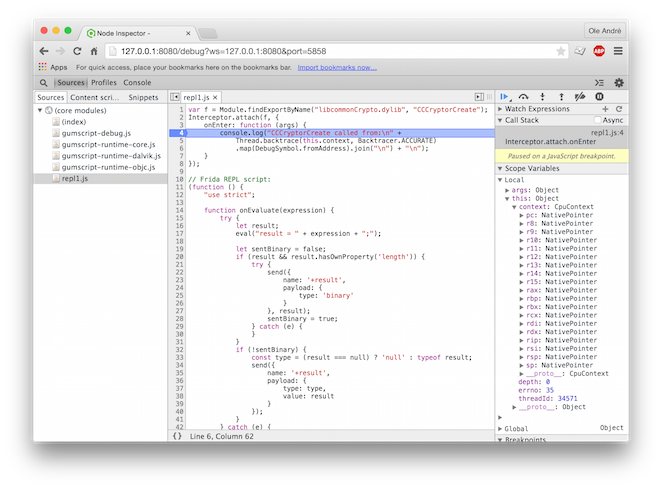Frida 4.0.0 Released ∞
release
It’s time for an insane release with tons of improvements.
Let’s start with a user-facing change. The CLI tool called frida-repl has been renamed to just frida, and now does tab completion! This and some other awesome REPL goodies were contributed by @fitblip.
There is also integrated support for launching scripts straight from the shell:
$ frida Calculator -l calc.js
_____
(_____)
| | Frida 4.0.0 - A world-class dynamic
| | instrumentation framework
|`-'|
| | Commands:
| | help -> Displays the help system
| | object? -> Display information about 'object'
| | exit/quit -> Exit
| |
| | More info at https://frida.re/docs/home/
`._.'
# The code in calc.js has now been loaded and executed
[Local::ProcName::Calculator]->
# Reload it from file at any time
[Local::ProcName::Calculator]-> %reload
[Local::ProcName::Calculator]->Or, perhaps you’re tired of console.log() and would like to set some breakpoints in your scripts to help you understand what’s going on? Now you can, because Frida just got an integrated Node.js-compatible debugger.
(Cue “Yo Dawg” meme here.)
Yep yep, but it is actually quite useful, and all of the CLI tools provide
the --debug switch to enable it:
# Connect Frida to a locally-running Calculator.app
# and load calc.js with the debugger enabled
$ frida Calculator -l calc.js --debug
_____
(_____)
| | Frida 4.0.0 - A world-class dynamic
| | instrumentation framework
|`-'|
| | Commands:
| | help -> Displays the help system
| | object? -> Display information about 'object'
| | exit/quit -> Exit
| |
| | More info at https://frida.re/docs/home/
`._.'
Debugger listening on port 5858
# We can now run node-inspector and start debugging calc.js
[Local::ProcName::Calculator]->Here’s what it looks like:

Ever found yourself wanting to frida-trace Objective-C APIs straight from the shell? Thanks to @Tyilo you now can:
# Trace ObjC method calls in Safari
$ frida-trace -m '-[NSView drawRect:]' SafariThere are also other goodies, like brand new support for generating backtraces and using debug symbols to symbolicate addresses:
const f = Module.getExportByName('libcommonCrypto.dylib',
'CCCryptorCreate');
Interceptor.attach(f, {
onEnter(args) {
console.log('CCCryptorCreate called from:\n' +
Thread.backtrace(this.context, Backtracer.ACCURATE)
.map(DebugSymbol.fromAddress).join('\n') + '\n');
}
});Or perhaps you’re on Windows and trying to figure out who’s accessing certain memory regions? Yeah? Well check out the brand new MemoryAccessMonitor. Technically this code isn’t new, but it just hasn’t been exposed to the JavaScript API until now.
Another nice feature is that starting with this release it is no longer
necessary to forward multiple TCP ports when using frida-server running
on another device, e.g. Android.
There is now also much better error feedback propagated all the way from a remote process to different exceptions in for example Python. With the previous release attaching to an inexistent pid on Mac would give you:
SystemError: GDBus.Error:org.gtk.GDBus.UnmappedGError.Quark._g_2↩
dio_2derror_2dquark.Code0: task_for_pid() for remote pid failed w↩
hile trying to make pipe endpoints: (os/kern) failure (5)Whoah, madness. This is now simply:
frida.ProcessNotFoundError: unable to find process with pid 1234That’s better. Let’s talk about performance. Perhaps you used frida-trace and wondered why it spent so much time “Resolving functions…”? On a typical iOS app resolving just one function would typically take about 8 seconds. This is now down to ~1 second. While there were some optimizations possible, I quickly realized that no matter how fast we make the enumeration of function exports, we would still need to transfer the data, and the transfer time alone could be unreasonable. Solution? Just move the logic to the target process and transfer the logic instead of the data. Simple. Also, the Dalvik and ObjC interfaces have been optimized so seconds have been reduced to milliseconds. The short story here is further laziness in when we interrogate the language runtimes. We took this quite far in the ObjC interface, where we now use ES6 proxies to provide a more idiomatic and efficient API.
That brings us to the next topic. The ObjC interface has changed a bit. Essentially:
const NSString = ObjC.use("NSString");is now:
const NSString = ObjC.classes.NSString;You still use ObjC.classes for enumerating the currently loaded classes,
but this is now behaving like an object mapping class name to a JavaScript ObjC
binding.
Also, there’s no more casting, so instead of:
const NSSound = ObjC.use('NSSound');
const sound = ObjC.cast(ptr("0x1234"), NSSound);You just go:
const sound = new ObjC.Object(ptr("0x1234"));Yep, no more class hierarchies trying to mimic the ObjC one. Just a fully dynamic wrapper where method wrappers are built on the first access, and the list of methods isn’t fetched unless you try to enumerate the object’s properties.
Anyway, this is getting long, so let’s summarize the other key changes:
- The Dalvik interface now handles varargs methods. Thanks to @dmchell for reporting and helping track this down.
- NativePointer also provides
.and(),.or()and.xor()thanks to @Tyilo. - The Interceptor’s onEnter/onLeave callbacks used to expose the CPU
registers through
this.registers, which has been renamed tothis.context, and now allows you to write to the registers as well. - Process.enumerateThreads()’s thread objects got their CPU context field
renamed from
registerstocontextfor consistency. - Synchronous versions of enumerateFoo() API available as enumerateFooSync() methods that simply return an array with all of the items.
Memory.readCString()is now available for reading ASCII C strings.Frida.versioncan be interrogated to check which version you’re running, and this is also provided on the frida-core end, which for example is exposed by frida-python throughfrida.__version__.- Stalker now supports the jecxz and jrcxz instructions. This is good news for CryptoShark, which should soon provide some updated binaries to bundle the latest version of Frida.
- V8 has been updated to 4.3.62, and a lot of ES6 features have been enabled.
- We’re now using a development version of the upcoming Capstone 4.0.
- All third-party dependencies have been updated to the latest and greatest.
- Windows XP is now supported. This is not a joke. I realized that we didn’t actually use any post-XP APIs, and as I had to rebuild the dependencies on Windows I figured we might as well just lower our OS requirements to help those of you still instrumenting software on XP.
Enjoy!
 oleavr
oleavr